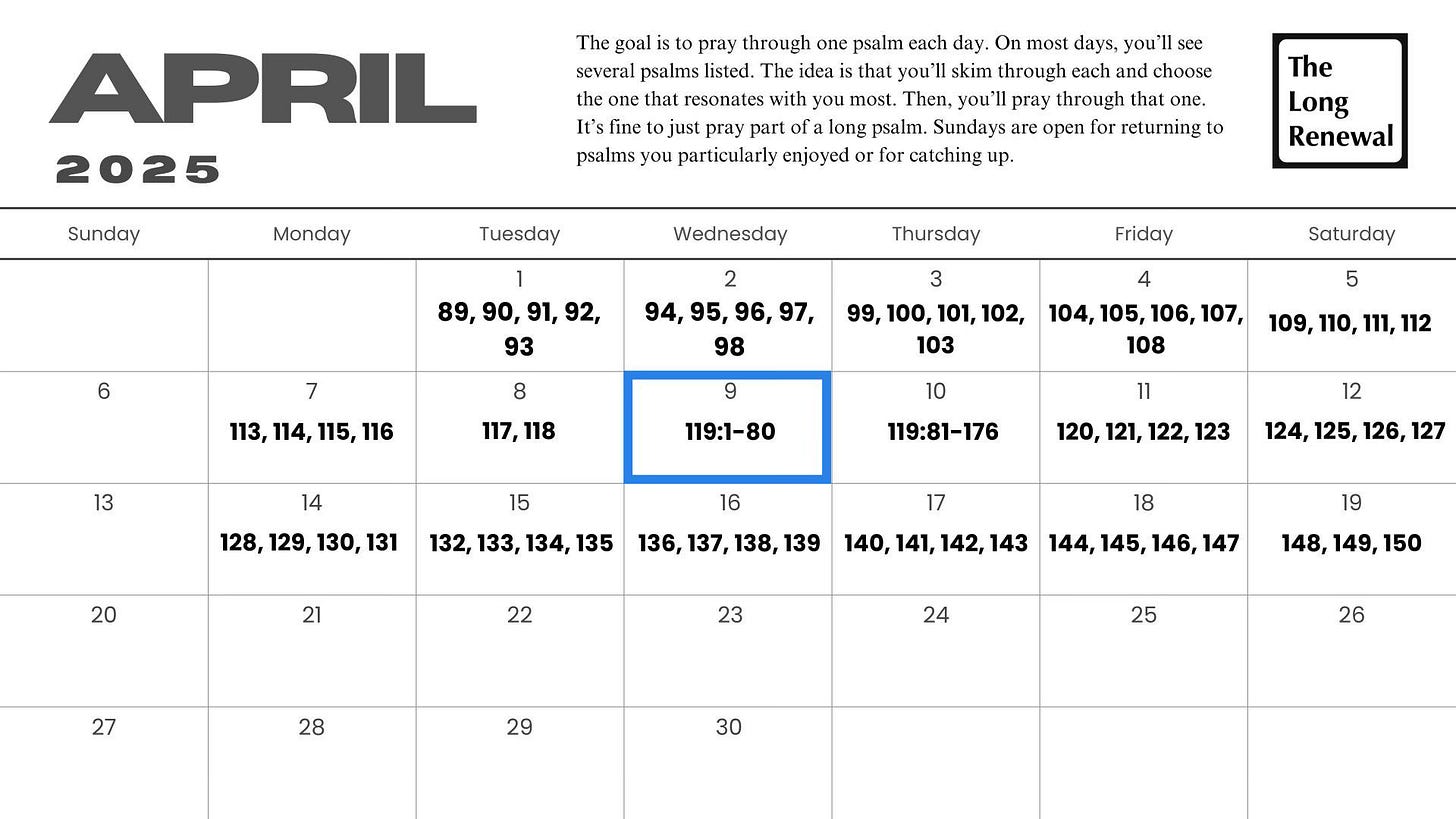If the Word Were the Air That We Breathed
Stepping into the world of Psalm 119
With my whole heart I seek you;
let me not wander from your commandments!
I have stored up your word in my heart,
that I might not sin against you.
Psalm 119:10–11
As a new Christian, I was warned that Jesus’ arch-opponents, the Pharisees, had memorized the entire Torah. I heard this fairly often, in fact. It came up in sermons and, occasionally, even in casual conversation. The takeaway was that you can live a fanatically spiritual life and still end up with a withered soul. Salvation, the example reminded us, was by faith, not by works.
That’s true. But in hindsight, I’d say that particular knock on the Pharisees came with a downside. For one thing, few Christians today memorize much Scripture to begin with. And if you’re told it’s stone-cold legalists who are into that kind of thing, well, all the more reason not to bother.
Psalm 119 challenges such dismissiveness. It offers evidence that Scripture should simply be part of the air we breathe. This idea is knit into the very form of this massive psalm. The longest chapter in the entire Bible, Psalm 119 has a unique acrostic structure:
It’s made up of 22 stanzas, one for each letter of the Hebrew alphabet.
Each stanza contains 8 verses, and within each section, every verse begins with the same Hebrew letter.
For example, verses 1–8 each begin with aleph (א), the first letter of the Hebrew alphabet. Next, verses 9–16 start with bet (ב), the second letter. This continues through all 22 letters, concluding with tav (ת), which begins verses 169–176.
This remarkable structure isn’t apparent, of course, in an English translation. But the patterns in the original language reveal that Psalm 119 was designed for memorization. Imagine if you were trying to memorize a song that was 176 verses long. It would be incredibly hard to retain that much. And even if you managed that, you’d still have the nightmare of trying to keep it all in order when you recited it. Imagine how helpful it would be if the first eight verses started with A, the next with B, and so on.
Then again, is this really something we modern Christians need to know? It could, I suppose, leave us feeling like underachievers when it comes to memorizing Scripture. But that’s not my intention. Rather, I want to offer a glimpse into the untapped potential God’s Word holds for our spiritual transformation.
Here’s what I mean. Even at our best, most of us only experience the Bible for a short part of each day. We may read a chapter or so, and we might pray along with that. And then we put the book down, and we go about our day, hoping we’ll remember some tidbits of God’s truth when we need them. As a result, our time in Scripture is, for the most part, fenced off from the rest of our life.
Psalm 119 offers the exciting possibility that this fence can be torn down. An ancient Hebrew might have quietly spoken this psalm to himself throughout the day. Let’s imagine he’s in the marketplace and, seeing a very wealthy person, feels a pang of envy. He could murmur verse 14: “In the way of your testimonies I delight as much as in all riches,” reminding himself of God’s ultimate worth. Exhausted after a day of physical toil, he might ponder verse 25: “My soul clings to the dust; give me life according to your word.” Or enjoying an extraordinary sunset, it might be verse 64 that settles on his heart: “The earth, O Lord, is full of your steadfast love; teach me your statutes!”
Imagine truths like these arriving to rest on your soul at just the right moment. Your appreciation of both God’s world and God’s Word would deepen, each enlivening your gratitude for the other. Instead of the background noise of a song you’ve heard hundreds of times, or the intrusion of an unwanted advertisement, your mind is filled with inspired reminders.
This was the world inhabited by many ancient Hebrews, as well as countless Christians down through the centuries. Scripture was simply the song of their hearts. It was the air they breathed, day and night.
The prospect of ever arriving at that precipice can seem daunting to us today, though. Ancient cultures were oral cultures. As a result, committing long texts to memory was simply a way of life. Our ancestors who could recall Psalm 119 from aleph to tav may have been as unimpressed with that ability as we are of the astonishing fact that we can read and write.
Which of course, only underscores the challenge. A life where God’s word is as readily available to us as oxygen may sound captivating—and seem just as remote. It does take time and toil to store God’s word up in your heart. One great help is learning to sing psalms and other Scripture.
And you can start by simply using what you already know. If that’s only Genesis 1:1 and John 3:16, so be it. God’s power in creation and the kind of love that compelled him to give his only Son for sinners can spur hours of contemplation.
I was recently blessed by a well-loved Bible verse myself. The day I wrote this post, I was out working in the yard when Psalm 23:1 came to mind. I happened to be putting soil into the garden box I shared about a while back. The box is on our rear patio in a spot you can’t get to with a vehicle. Lacking a wheelbarrow, I was shoveling the dirt into a plastic green trash can with wheels. Then I’d awkwardly roll it around back and dump it into the cedar planter. My young kids were determined to help, which was wonderful. It also caused everything to take five times as long. My mind started bouncing to other things I hoped to get done after the project. Always so much to do.
I decided to fight my impatience with Scripture. “The Lord is my Shepherd,” I whispered to myself, “nothing shall I lack.” An unexpected thought burst in right away.
Time. If I truly lack nothing, then I don’t really lack for time. It’s all in my head. The Lord has given me the time I need to do everything he asks of me.
It’s reassuring when Scripture speaks so directly to our circumstances. But even when it doesn’t seem to, it’s still renewing our thoughts, elevating them, and slowly reshaping our minds after Christ’s own. And as that transformation takes place, we can join the psalmist in telling the Lord, “Your testimonies are my delight; they are my counselors” (Psalm 119:24).





"Time. If I truly lack nothing, then I don’t really lack for time. It’s all in my head. The Lord has given me the time I need to do everything he asks of me."
I needed this. I don't have trouble trusting God for stuff, but I definitely get stressed over not having enough time to do everything I need and want to do.